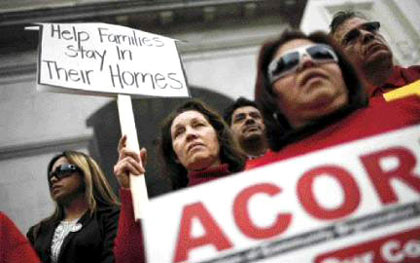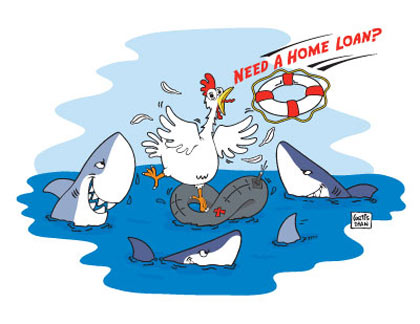You are hereBlogs / WcP.Common.Sense's blog / Bailout fever rescue economy or Market correct itself? How many trillions are enough? Who shouldn't be bailed out?
Bailout fever rescue economy or Market correct itself? How many trillions are enough? Who shouldn't be bailed out?

“Bailout” fever runs beyond the US, to affect Europe, to affect Asia… Market economy and private ownership - upon such economy systems democracy stands. The bailout tosses out dumb questions - don’t bailouts challenge the fundamentals of market economy? Impact on the ownership of the very top firms, the key performers in world’s major economies? Should market economy adjust itself or can it be rescued by bailouts? How many trillions would be enough in a global financial crisis? Who should not be bailed out?
(quote)
Has anyone bothered to ask: Why $700 billion? Why not $800 billion to bail out the economy? Or a trillion? Jeez, as long as the dam has burst, why not make it a cool $7 trillion?
Okay, $7 trillion it is, and if you think that's an exaggeration, you're wrong. In this year alone, we have committed an amount that is more than half of our entire annual gross national product to assorted bailouts and guarantees. No, that doesn't mean that we have diverted half our GNP for bailouts; it means that we have created half our gross national product virtually out of nothing.

Tuesday it was the Fed saying it would buy up to $600 billion more in mortgage-related assets and will lend up to $200 billion to holders of securities backed by some consumer loans. That $800 billion is more than what Social Security lays out each year, and twice as much as the federal government annually collects in corporate income tax. It is about three times as much the entire federal deficit. That's just in one day. Who knows what Wednesday will bring?
Consider: President George W. Bush has been passionately faulted for "breaking the bank" by conducting the Iraq War. But the non-partisan Congressional Research Service figures that the total cost of the Iraq War and the rest of the global war on terror, including the war in Afghanistan since Sept. 11, 2001 is $864 billion. Now, we can whistle past that in a single day, and few seem to worry. There are no metaphors for this because there is nothing comparable to the rapidity of our plunge into national hock.
I didn't make up that $7 trillion number; it comes from the Associated Press and includes funds to guarantee certain corporate assets and debts, even though--if we're lucky--they won't be spent. The figure, in chronological order, includes: $200 billion in Fed loans to prop up risky mortgage-backed securities as collateral; a $20 billion loan to JP Morgan Chase & Co., and that's just in March.
In May, the Fed increased the size of those earlier loans and decided to allow banks to put up less secure collateral. July brought the collapse of IndyMac bank, costing more billions to cover insured deposits, and a $300 billion housing bill for government backing of cheaper mortgages.

After a short break, September rolled around with: The Treasury saves Fannie Mae and Freddie Mac for $200 billion; another $85 billion goes to save American International Group; yet another $70 billion pumped by the Fed into the financial system to ease the credit crunch; the Treasury temporarily guarantees money market fund losses up to $50 billion, and the Fed makes another $330 billion available to central banks and $225 billion to other financial institutions.
October brings $150 billion more in loans to banks, an underdetermined sum to buy commercial paper (as much as $1.3 trillion of the outstanding short-term business loans might qualify); $38 billion more for AIG; $250 billion of TARP funds into banks, etc.; temporary guarantees of inter-bank loans of up to $1.4 trillion, and $540 billion for liquidity for money market mutual funds.
Some November's moves may already seem like ancient history, but here's just some of it: $33.6 billion in capital to 21 banks; $20 billion to Citigroup; Fed and FDIC pledges to backstop possible Citigroup losses on $306 billion in real estate assets....
I've run out of space to provide a complete list, but Washington apparently hasn't run out of money. Which is to say, Washington thinks that it hasn't run out of people and countries that will lend it money. At the rate that money is fleeing into Treasury notes, maybe Washington is right, but if we're ever to get the economy to stop sagging, some of that money will have to flow back into equities.

"Talk about throwing money at a problem," said Sheila A. Weinberg, founder of the Northbrook (Ill.) based Institute for Truth in Accounting. "The better question is where is all this money coming from? The people I ask either don't know, believe that it's money we have on hand or will come from taxing the wealthy. We're borrowing it. About half of the borrowings are coming from foreign entities."
She noted the irony of the Treasury having to borrow money to bail out companies that can't borrow money. "It is very scary to see the rate that our national debt is increasing. On Sep. 30, the official debt reached $10 trillion. Then in less than a month, we had borrowed another half a trillion. Now the official debt is $10.655 trillion."
But that's just one way--the easy way--to look at it. The real debt, when you include the more than $47 trillion of commitments for retirement benefits, is a staggering $57 trillion. That amounts to $188,000 for each American.
The economic sages advise us that we can't worry about how to repay the debt and how it will affect future generations. We have no choice if, we want to save the economy, but to spend money blindly. As if we were a family that found itself so far in debt that it had no other choice but to borrow ourselves further into the hole.
In just eight months, we have made a fundamental change in our financial system and our form of government, without much debate or with, I dare say, no foresight. I'm glad I don't have to make these kinds of decisions, but I can't help think that we have lost something in our national character; we have become so fearful of the present that we are willing to mortgage our future, to risk the kind of calamity that could far surpass the present one. It's perhaps the most high-risk bet our country has made since we stood down the Soviet Union in the Cuban Missile Crisis.
(unquote)
Dennis Byrne is a Chicago Tribune op-ed columnist. dennis@dennisbyrne.net.
Photos Courtesy of Rob Rogers / Pittsburgh Post-Gazette, Mark Hurwitt / BlackCommentator.com, Max Whittaker / Reuters, and The Curtoons Cartoon Company
Original Source: Real Clear Politics


















